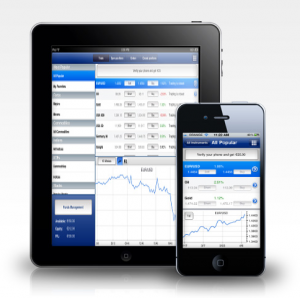 The surprise decision of the SNB to abandon the artificially supported floor price in the EURCHF currency pair last week sent shockwaves through the forex markets, and wreaked havoc on forex brokers worldwide.
The surprise decision of the SNB to abandon the artificially supported floor price in the EURCHF currency pair last week sent shockwaves through the forex markets, and wreaked havoc on forex brokers worldwide.
Many large hedge funds and market making institutions were short the currency at the time of the announcement and suffered catastrophic losses, with some losing their entire capital under management.
Both institutional brokers such as Deutsche Bank and Barclays, and retail brokers including Alpari and FXCM, were left scrambling to liquidate positions held by clients unable to answer margin calls.
5 Brokers that Gained from the Volatility
However, not every brokerage firm’s clients were net short the Swiss Franc, meaning that some brokers profited substantially from Thursday’s fallout. Here are the biggest winners from last week’s exchange rate debacle:
#1 XTB
XTB is top of our list, believed to be expecting a net profit in excess of $17.4 million following the calamity.
XTB Group consists of both a retail arm and an institutional entity – X Open Hub – which acts as a liquidity provider. The broker has attributed much of its ability to weather last week’s currency storm to the risk management technology of X Open Hub, enabling it to adjust its exposure and limit losses.
Other factors appear to have been XTB Group’s pre-emptive measures to rein in leverage (already conservative at 100:1) on the EURCHF pair several months back, and a number of clients holding sizeable long positions in Swiss Franc pairs at the time of the SNB announcement.
#2 IronFX
 IronFX have also confirmed that their balance sheet remained strong following Thursday’s rout, with projected profits of around $15 million.
IronFX have also confirmed that their balance sheet remained strong following Thursday’s rout, with projected profits of around $15 million.
IronFX Global Limited was not affected by these events due to our strong risk management systems and procedures and we continue complying well with our capital regulatory requirements under all regulatory bodies we have licenses.
We would therefore like to inform our clients that we continue conducting our business as usual.
The crisis was essentially one of liquidity, and IronFX source theirs from a pool of 17 investment rated banks and top-tier liquidity providers, so this may well have allowed clients of this broker, whose offering includes STP/ECN accounts, to continue to match their orders in spite of the volatility.
#3 GAIN Capital
The broker GAIN Capital is also amongst those reporting a profit expected to be up to of $10 million following the announcement.
In a statement CEO Glenn Stevens explained:
We remain focused on managing our risk, taking a conservative approach to managing our exposure to global currencies, while providing liquidity and high-quality execution to our global client base.
#4 Plus500
Plus500 reported a “profitable trading performance” for the day of the crash, attributing estimated profits of around $3 million to the “robustness of its risk management policies and processes which effectively managed the company’s exposure to the Swiss franc”.
 The broker provides a Contract for Difference (CFD) service covering multiple asset classes such as stocks and commodities, so its currency exposure would naturally have formed a smaller portion of its client’s positions. Firms who offer trading in a range of markets inevitably have reduced exposure to each.
The broker provides a Contract for Difference (CFD) service covering multiple asset classes such as stocks and commodities, so its currency exposure would naturally have formed a smaller portion of its client’s positions. Firms who offer trading in a range of markets inevitably have reduced exposure to each.
The firm is known to market itself towards more experienced market participants, so the number of customers making poorly diversified and highly leveraged bets may have been lower than elsewhere.
Another factor that may have contributed to the ability of these brokers to weather last week’s storm is that they are all heavily regulated. Plus500 is authorized and regulated in each individual jurisdiction in which it operates:
- Plus500UK LTD is authorised and regulated by the Financial Conduct Authority
- Plus500 CY LTD is authorised and regulated by the Cyprus Securities and Exchange Commission
- Plus500 AU LTD is regulated by Australian Securities and investments Commission
For more information, take a look at our simple guide to forex broker regulation.
Please remember that your capital is at risk.
#5 Markets.com
Finally, the Markets.com brand operated by Safecap Investments (also responsible for the ForexYard and EC Markets offerings) appear to have ended the day positive, with anticipated profits of around $1 million.

Furthermore, they held good on their guarantee against the possibility of negative account balances, closing their client’s positions out to avoid losses and using their capital reserves to balance their books.
Markets.com is happy to update all of its clients, that as per its previous commitment to its clients, the Company is forgiving all negative balances on clients’ accounts that were caused when clients couldn’t close their Swiss Franc positions fast enough. Markets.com has a firm commitment to its retail clients that they can never risk more than the funds in their account, and thus when severe market volatility and gaps take place, the Company adjusts clients’ negative balances accordingly.
In addition to the benefits of capitalization that Safecap Investments bring, they also insure client’s funds up to EUR 20,000.
Risk Averse or Just Plain Lucky?

Of course, it’s totally impossible to know whether the impact of this event on each broker’s balance sheet was due to superior risk management or simply the luck of the draw.
If a broker was fortunate enough to have clients net long the Swiss Franc then these firms may have enjoyed a massive run-up in account equity through no skill of their own. Some brokers may simply have witnessed a white rather than a black swan event!
Losses Are Relative
 One of the brokers suffering the largest losses in dollar terms was Interactive Brokers, who estimate that a handful of clients were principally responsible for losses in excess of $120 million. However, Interactive Brokers were quick to shrug off this loss, issuing a brief statement making clear that the debits accounted to just a small fraction of its massive $5 billion in customer account equity.
One of the brokers suffering the largest losses in dollar terms was Interactive Brokers, who estimate that a handful of clients were principally responsible for losses in excess of $120 million. However, Interactive Brokers were quick to shrug off this loss, issuing a brief statement making clear that the debits accounted to just a small fraction of its massive $5 billion in customer account equity.
Due to the sudden move in the value of the Swiss Franc (“CHF”) yesterday, several of our customers suffered losses in excess of their deposit with us. Such debits amount to approximately $120 million, less than 2.5% of our net worth.
It seems clear that Interactive Broker’s exposure to the Swiss Franc was actually relatively limited in real terms.
Issues in finding liquidity will of course tend to impact more on larger firms such as Interactive Brokers, where the sheer size of client positions to be liquidated exacerbates the problem.
What Happens Next?
Whatever the outcome for those brokers currently in a position of insolvency or facing bailouts or sales, there is little doubt that this overnight sea-change in central bank policy has reshaped the landscape for forex brokers worldwide.
As the buyouts are announced and the mauled hedge funds continue to liquidate their remaining assets early this week, the lie of the land should soon become a little clearer.
